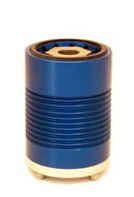i was wondering if someone could explain to me what 3 things on filters as i am looking into running a remote oil filter mount and thus searching for the type of filter i want to run
1) anti drain back valve: in my particular scenario i will be mounting the oil filter vertical, but does this really mean than there is a check valve in the oil filter that will not allow oil to drian out backwards from the filter once the motor is off. When is there a benifit to having this feautre on a filter.
2) by-pass valve: I am under the impression that this means the if the oil filter sees more than "X" psi then it will bypass some oil and send it back to the motor UN filtered. Is that correct? Sounds like a big no no to me.
3) micron size. I am currently looking at WIX filters and their racing versions seem to have 61micron size yet their stock wix filters (like the 51258 that RJC recommends for his biggie filter setup is 21 micron. I am under the impression that the smaller the micron size, the better, but i am sure there is a limit. Can someone elaborate.
I really hope this stuff helps other people and not just myself.
Thanks alot in Advance
Adrian
1) anti drain back valve: in my particular scenario i will be mounting the oil filter vertical, but does this really mean than there is a check valve in the oil filter that will not allow oil to drian out backwards from the filter once the motor is off. When is there a benifit to having this feautre on a filter.
2) by-pass valve: I am under the impression that this means the if the oil filter sees more than "X" psi then it will bypass some oil and send it back to the motor UN filtered. Is that correct? Sounds like a big no no to me.
3) micron size. I am currently looking at WIX filters and their racing versions seem to have 61micron size yet their stock wix filters (like the 51258 that RJC recommends for his biggie filter setup is 21 micron. I am under the impression that the smaller the micron size, the better, but i am sure there is a limit. Can someone elaborate.
I really hope this stuff helps other people and not just myself.
Thanks alot in Advance
Adrian

